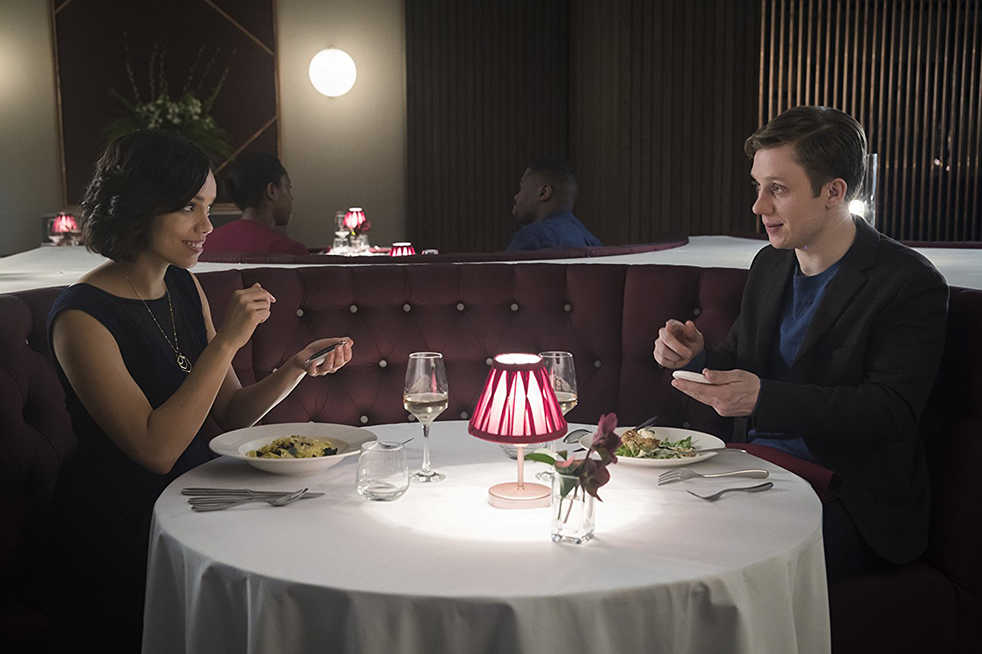“Black Mirror,” Netflix’s hit science fiction anthology series, returned to the streaming service with a new crop of episodes late last month, capping off 2017
with an appropriately disturbing six hours of existential technological dread.
This season included topics ranging from a futuristic dating app and a virtual reality Star Trek parody to human-hunting robots and the morality of torturing artificial intelligence.
The season kicks off with the heavily-advertised “U.S.S. Callister,” a 76-minute standout in what could be considered the show’s strongest season to date.
Viewers are immediately thrust into the control room of the U.S.S. Callister.
A less than subtle pastiche of Star Trek’s U.S.S. Enterprise, the episode is complete with over-the-top dialogue and dated analogue effects. Though the introduction is comically jarring, the ensemble cast flawlessly anchors the “U.S.S. Callister”: Jesse Plemmons (“Breaking Bad”), Jimmi Simpson (“Westworld”), Cristin Miloti (“Fargo”) and Michaela Coel (“Chewing Gum”).
The plot of “Callister” is nothing new for the series. Using a near-future technology, coder Robert Daly (Plemmons) creates a virtual world based on Space Fleet, the Black Mirror universe’s version of Star Trek.
The anxious, slovenly Daly fills the world with virtual versions of people who have slighted him in the real world. The arrival of his crew’s newest member, a young female coder (Miloti), provides the impetus for the episode’s conflict.
Black Mirror is at its best when it relegates its tech-heavy premise to serve as a vehicle for more emotional and human-centered narratives, and “Callister” may be the best example of this technique since the first season’s “The Entire History of You.”
By exploring the gender dynamics of the tech industry, as well as the thinly-veiled toxicity inherent in the “nice guy” attitude championed by people like Daly, “Callister” reminds viewers
what “Black Mirror” is all about while still weaving a fun and memorable narrative.
When viewers inevitably click next episode at the tail end of the season’s stellar lead, they are met with the “Arkangel,” directed by Jodie Foster. Even if one pretends that the standard set by
“Callister” was not unattainably high, the 62-minute mother-daughter drama is still disappointing at best.
The concept and characterization are both solid. An anxious and overprotective mother tests a new technology that allows her to, quite literally, keep a better eye on her child. This promising foundation could have gone in any number of directions, but creator Charlie Brooker unfortunately chose a path rife with clichés and borderline unbelievable coincidences that water down the narrative and lead to the most underwhelming episode of the season.
The quality picks back up with “Crocodile,” the harrowing story of Mia Nolan (Andrea Riseborough, “Oblivion”) on a homicidal journey to cover up a fatal hit-and-run from an insurance agent Shazia Akhand (Kiran Sonia Sawar, “Murdered by My Father”) and her memory-reading computer.
From its start, the plot is engaging enough to keep viewers tense, but the lead’s stiff acting and a flaccid conclusion keep “Crocodile” from being anything more than middling, especially when compared to the season’s other non-“Arkangel” episodes. While it marks the welcome return of a particular musical motif from earlier seasons, one cannot help but wish it was utilized in a more impactful episode.
If last season’s “San Junipero” wasn’t proof enough of Brooker’s ability to set a love story in his caustically satirical future world, season four’s “Hang the DJ” is enough to render even the most ardent critics speechless. With dating apps permeating the public consciousness more than ever, the show fittingly based an episode around the concept.
Immaculate performances by Georgina Campbell (“Broadchurch”) and Joe Cole (“Peaky Blinders”) as the cautious, disillusioned Amy and anxious millennial Frank, respectively, drive the uniquely poignant romance to its self-edifying and surprisingly optimistic conclusion.
Though “Callister” will ultimately be the season’s standout episode, “Hang the DJ” is a master class in raw, emotional storytelling. Addressing the hypersexual landscape of dating without being gratuitous, the episode demonstrates the shallow nature of apps like Tinder without relying on clichés. Most importantly, it deftly builds all of this into the most gripping climax the series has ever produced.
The dialogue-heavy love story of “Hang the DJ” provides a stark contrast to the atmospheric, single-character thriller “Metalhead,” an episode that features the show’s fewest lines of dialogue.
Anyone who has seen the terrifyingly agile AI robots from Boston Dynamics can attest that the killer robots of “Metalhead” are just one step removed from current technology, allowing the episode to capitalize on uncomfortable proximity between its apocalyptic world and the viewer’s own reality.
Maxine Peake (“The Theory of Everything”) carries the episode on her own, portraying the resilient sole survivor of an attack by a merciless AI dog. With director David Slade’s beautiful black-and-white aesthetic and some uncanny CGI, “Metalhead” may be the most thrilling — if not pleasantly unique — episode to date.
“Black Mirror” prides itself on its ability to make viewers think, leaving their mental gears turning long after the credits roll. Accordingly, Brooker ends the season on a bizarre note with “Black Museum.” The episode plays as a series of disturbing vignettes, relayed by the lovably flamboyant museum curator Rolo Haynes (Douglas Hodge, “The Night Manager”).
Hodge’s role as Haynes more than makes up for the more understated style of Letitia Wright (“My Brother the Devil”), who plays the episode’s protagonist. Though somewhat sloppily assembled, the strength of the individual mini-stories makes “Black Museum” a must-watch and undeniably disturbing addition to the show’s anthology.
From the spectacle of “U.S.S. Callister” and the poignant romance of “Hang the DJ” to the anxious terror of “Metalhead” and the dark humor of “Black Museum,” season four runs the entire gamut of human emotion.
The season’s human-centered and often optimistic direction keeps the series feeling fresh, despite the reuse of several concepts. Two lackluster episodes hold the season back from being a masterpiece, but clearly Brooker still captivates his audience in new ways.
